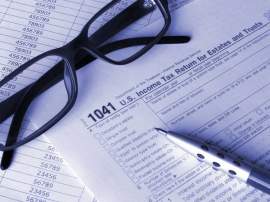
Real Property Tax Funding of Public Schools

Given the United State's economic frailty, the close relationship between property tax revenue and funding for public education has been recently questioned. Local governments levy property taxes to produce an array of public goods:maintain and build roads, offer citizens protection through law enforcement agencies, and provide public schooling. The tax revenues generated through real property tax are by far a localities biggest money maker.
The majority of tax revenues levied from real property tax are "kicked back" into the community in the form of public schooling-nearly 50% of property tax revenue is spent on public schooling. The tax revenues are used to fund public schools and the costs they impose on a community-teachers salaries, utilities such as electricity, books, resources needed for students, athletics, transportation etc. The main problem in regards to tax revenues and public school funding revolves around a school's dichotomy-schools are extremely expensive to maintain and run, yet vital to the well being and future of society.
Given the recent economic news, the failure of corporations, and the mere collapse of housing markets, many state and local governments have experienced a deficit or a severe shortage in state funding. Localities, like every other aspect of society has been pinched due to the economic turmoil. Consumption, property values, and incomes have drastically decreased; these factors all greatly influence a communities tax revenues.
Sales taxes are directly proportional to consumption numbers, property values are directly proportional to real property taxes, and incomes of course are connected to the personal income tax. All of these economic factors tied into tax revenues have precipitously dropped since the recession. When a community has less tax revenue coming in, they fail to meet their costs and the needs of society. The relationship between tax revenue and public services are so sensitive; a drastic shock to the system like a recession can throw everything awry.
Real property tax revenues are the greatest form of income for a state government; the majority of real property tax revenue is distributed towards public schooling. This relationship or occurrence is typical throughout state governments across the country. Considering many states and localities are operating under a deficit, many politicians, lawmakers, and citizens believe that the amount of tax revenue distributed to public schools is exorbitant. The problem with this notion is twofold.
Education is obviously critical to the well being of a community and it's future; without education society would significantly regress. The other problem lies within the tax revenue makeup of less developed communities. Struggling cities or neighborhoods produce slim tax revenues, which are reflected on the lack of efficiency for their public schools. Should we ease the strain of struggling communities by further decreasing funding to an already struggling school?
Proponents for decreasing tax revenue or aid to public schools point to the fact the public education system in America is flawed. Research has shown that a correlation does not exist between public education expenditures and economic growth. Advocates for decreased funding claim that instead of maintaining high levels of funding for education, we should instead review the efficiency of a public school system.
Even with a high percentage of funding many students or teachers are not operating as effectively as they could be. This problem lies more within society and the family than it does with economics or the amount of funding given to schools. The debate is fierce, one that varies based on jurisdiction, and has no true equilibrium.



















